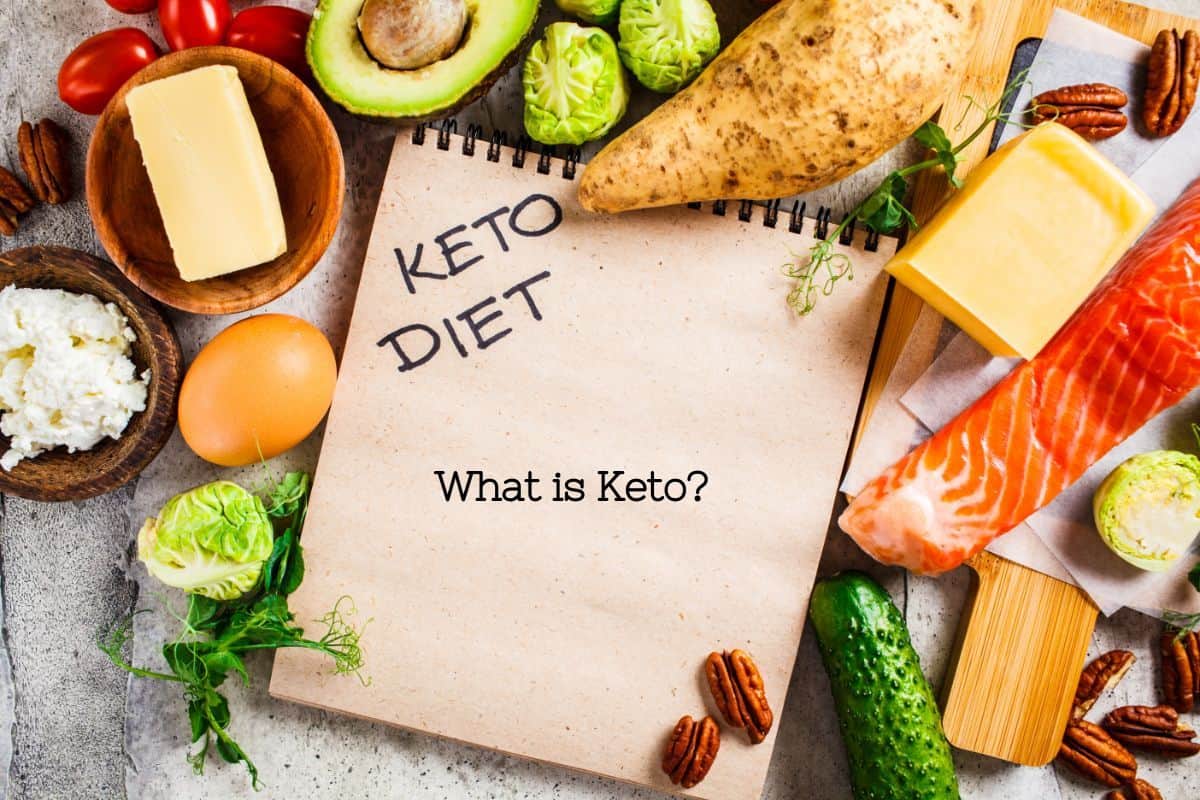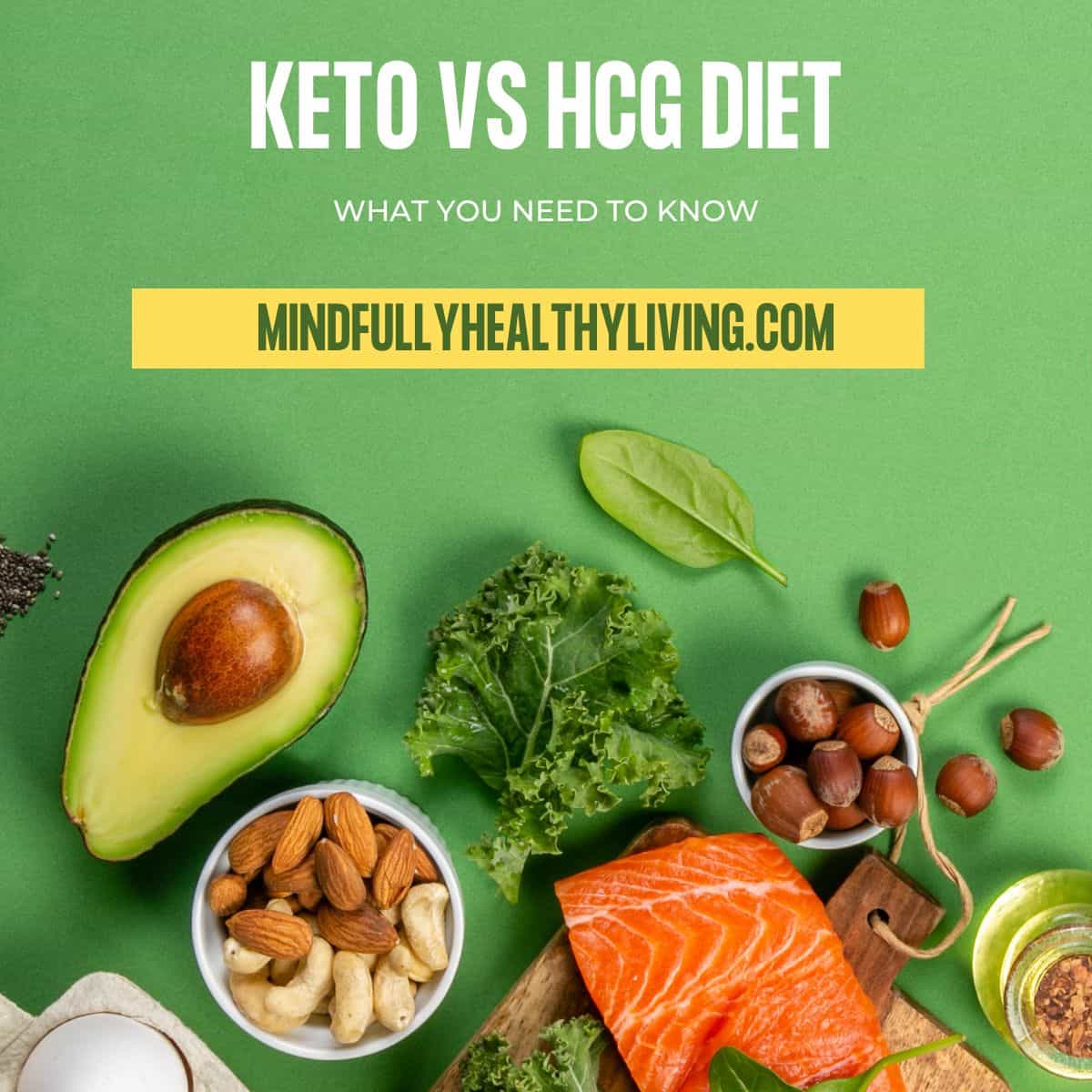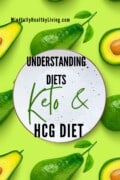Keto vs hCG - In the realm of weight loss strategies, the keto diet and the hCG diet stand as two distinct approaches that have garnered significant attention. These diet plans promise rapid results, but understanding the differences between them is essential.
Jump to:
The ketogenic diet, commonly referred to as the keto diet, emphasizes a low-carb, high-fat eating plan. It aims to induce a state of ketosis, where the body burns fat for energy instead of carbohydrates. Many individuals have lauded its effectiveness for shedding pounds.
Conversely, the hCG diet focuses on immediate weight loss by combining a low-calorie diet with hCG hormone supplementation.
This method claims to target fat stores, leading to rapid weight loss. However, concerns exist regarding its safety and long term effectiveness.
Before embarking on any weight loss journey, especially if you have underlying medical conditions, consulting a healthcare professional is paramount.
They can provide personalized guidance tailored to your unique needs and health status. Remember, what works for one person may not be suitable for another.
This article serves solely for informational purposes and should not be considered medical advice. It's essential to consult with a healthcare provider before making significant dietary changes, especially if you have medical conditions. Your well-being should always be the top priority.
What is Keto
The ketogenic diet is a low-carb diet plan that focuses on shifting your body's primary energy source from carbohydrates to fat.
Understanding the mechanics of this diet is crucial to grasping its potential for fat loss and its broader implications for overall health.
Low-Carb Diet and Carbohydrate Intake
A cornerstone of the keto diet is its low-carbohydrate approach.
Typically, individuals on a keto diet restrict their daily grams of total carbs to a specific range, often around 20-50 grams per day.
By significantly reducing carbohydrate intake, the body enters a state known as ketosis.

Ketosis and Ketone Bodies
In ketosis, the body begins to produce ketone bodies, molecules generated from fat breakdown.
These ketone bodies serve as an alternative and efficient energy source when carbohydrates are limited.
This metabolic state is at the core of the ketogenic diet's effectiveness for fat burning.
Moderate Amount of Protein
While it's low in carbs, the keto diet includes a moderate amount of protein, ensuring that the body still receives essential nutrients and doesn't break down muscle mass.
Protein intake varies depending on individual needs and goals.
Level of Ketones and Fat Burning
The level of ketones in the bloodstream indicates the degree of ketosis.
For many, the goal is to maintain a steady and moderate level of ketones, although extremely high levels of ketones are not necessarily better.
This state encourages the body to tap into its body fat stores as a fuel source, making it an attractive option for those aiming for fat loss.
Scientific Evidence and Treatment of Obesity
There is growing scientific evidence supporting the keto diet as a viable option for the treatment of obesity and other health conditions.
Studies have shown that this high-fat, low-carbohydrate diet can lead to substantial weight loss and improved metabolic health.
It has also been shown to improve blood sugar control and have a positive impact on the rates of heart disease.
However, this diet is not for everyone and there are important considerations to become aware of.
High-Fat Diet
The keto diet is, fundamentally, a high-fat diet. Healthy fats like avocados, nuts, seeds, coconut oil, ghee, and olive oil become the primary source of calories, replacing carbohydrates.
This shift is essential in maintaining ketosis and promoting fat metabolism.
It's crucial to monitor your level of ketones and maintain a moderate amount of protein while adhering to this eating plan.
The scientific evidence supports its potential for fat loss and the treatment of obesity.
Clean Keto vs Dirty Keto
In the world of keto diets, it's essential to distinguish between two main approaches: clean keto and dirty keto.

These choices can significantly impact your health and well-being, as well as your success on a ketogenic diet.
Here, we'll explore the differences and help you make the best option for your journey toward better health.
Before diving into the clean vs. dirty keto debate, it's worth mentioning that we have a dedicated article on the clean keto diet along with a comprehensive 7-day meal plan.
This resource can guide you in crafting a ketogenic meal plan that emphasizes wholesome, nutrient-dense choices.
Clean Keto
Clean keto adheres to the principles of a high-fat, low-carb diet, but with an emphasis on quality.
It prioritizes nutrient-rich, whole foods like organic lean protein, healthy fatty acids, and plenty of non-starchy vegetables.
This approach aligns with the broader goal of maintaining health while achieving ketosis, making it the best option for many.
Check out our guide to a processed-free diet and the 7 benefits of eating clean!
Dirty Keto
On the other hand, Dirty Keto solely focuses on macronutrient ratios without considering food quality.
It often relies heavily on high-fat foods that may be laden with artificial sweeteners, toxic chemicals, and unhealthy fats like trans fats and hydrogenated oils.
These unhealthy ingredients will do more harm than good and can trigger disease and even weight gain instead of fighting it!
While dirty keto can induce ketosis, it's not necessarily the best option for overall well-being.
Dirty keto sometimes includes processed foods with artificial sweeteners, which can disrupt the body's ability to recognize sweetness properly.
Additionally, it might promote the consumption of high-fat, low-nutrient foods, which can lead to imbalances in health. Check out our natural guide to keto sweeteners.
Maintaining Lean Muscle Mass
Both clean and dirty keto can lead to weight loss, but clean keto emphasizes lean muscle mass preservation.
A high fat diet that incorporates lean protein sources can help maintain muscle health while promoting fat loss.
Regardless of which keto approach you choose, it's vital to drink water and stay well-hydrated. Adequate hydration supports your body's functions and aids in ketone production.
Additionally, consider exploring our keto and low-sugar section for recipes and resources on managing your low-carb lifestyle healthily.
Understanding the Keto Flu
As you begin your ketogenic journey, it's essential to be aware of a common phenomenon known as the keto flu.

This temporary phase often occurs during the early stages of the ketogenic diet, typically within the first week of transitioning to a low-carb, high-fat eating plan. Let's delve into what the keto flu is, its symptoms, and how to manage it effectively.
Transitioning into Ketosis: For most people, the keto flu is a natural part of the transition into ketosis, where your body shifts from using carbohydrates as its primary energy source to relying on ketone bodies from fat stores.
This shift that occurs is a key component of the keto diet's success in promoting weight loss. However, the experience of keto flu symptoms differs from person to person.
Unique Carb Limit: The onset and severity of the keto flu can vary from person to person, depending on factors like individual carb limit, prior dietary habits, and overall health.
It's important to understand that it's a temporary phase, and many people experience it as their bodies adjust to this new metabolic state.
Symptoms of the Keto Flu: Common symptoms of the keto flu include fatigue, headache, dizziness, nausea, muscle cramps, and irritability.
These discomforts arise as your body adapts to using ketones for energy instead of carbohydrates. This can be similar to a detoxification healing crisis.
As the body burns fat, it is also processing the toxins that can often be stored in the fat cells.
The detoxification organs and pathways may benefit from some support. For that, there are many different supportive options like our lemon juice liver cleanse or mucoid plaque cleanse.
Managing the Keto Flu: While the keto flu can be challenging, there are strategies to help ease the transition:
- Hydration: Drinking plenty of spring water is crucial to prevent dehydration, which can exacerbate symptoms.
- Electrolytes: Maintaining electrolyte balance by consuming foods rich in potassium, magnesium, and sodium can help alleviate muscle cramps and fatigue.
- Gradual Transition: Consider gradually reducing carbohydrate intake over a few days to lessen the shock to your system.
- Nutrient-Dense Foods: Incorporate nutrient-dense, whole foods into your meal plan to support your overall well-being.
Keto Supplements and Test Strips: It's important to note that supplements like Shark Tank keto pills and keto sticks are not a guaranteed remedy for the keto flu.
Additionally, while ketone tests can help monitor ketone levels, they don't provide a comprehensive picture of your overall health.
These are just tools to boost and monitor your body's ability to go into ketosis.
 150 Ketone Test Strips with...Shop on Amazon
150 Ketone Test Strips with...Shop on Amazon
 LevelUp Clean MCT Oil Capsu...Shop on Amazon
LevelUp Clean MCT Oil Capsu...Shop on Amazon
The keto flu is a temporary phase that many individuals encounter during the initial stages of the ketogenic diet.
Understanding its symptoms and implementing strategies to manage discomfort can help you navigate this challenging yet transformative period.
Remember that the keto flu is a sign that your body is adjusting to a new metabolic state, one that can be a valuable tool on your journey towards improved health and weight loss.
What is hCG Diet
The hCG diet, which revolves around the use of human chorionic gonadotropin, has gained notoriety in recent years for its promise of significant weight loss.
Developed by Dr. Simeons in the 1950s, this diet combines the administration of hCG, typically in the form of hCG injections or hCG shots, with a severely restricted calorie intake, usually as low as a 500-calorie diet.

Let's explore the key components and controversies surrounding the hCG diet.
The Role of hCG
Human chorionic gonadotropin is a protein-based hormone produced during pregnancy. Dr Simeons proposed that using hCG in non-pregnant individuals could lead to the targeting and utilization of stored fat for energy, resulting in rapid weight loss.
The Caloric Intake
The hCG diet is characterized by an extremely low-calorie intake, often ranging from 500 to 800 calories per day. This severe calorie restriction is a drastic change for most individuals and is a fundamental aspect of the diet.
High Protein and Low Fat
While the caloric intake is minimal, the hCG diet encourages a diet that is high in protein and low in fat.
This protein-based approach aims to preserve muscle mass during the weight loss phase and mitigate some of the side effects associated with severe calorie restriction.
The Controversy
The hCG diet has sparked controversy among healthcare professionals and nutrition experts.
While some individuals report significant weight loss while following it, critics argue that this can be attributed to the severe calorie restriction rather than the use of hCG.
The diet's long-term sustainability is questionable, and concerns about side effects, including severe hunger pangs, have been raised.
Consult a Healthcare Provider
Before considering the hCG diet or any drastic dietary change, it's crucial to consult a healthcare provider.
They can assess whether this approach aligns with your health goals and address potential risks associated with such a low-calorie and low-fat diet.
It is definitely NOT intended to be a long-term solution. This diet may be effective if, when reintroducing more calories, one slowly chooses healthy and nutrient-dense foods that nourish the body.
Cholesterol Levels and Cortisol
Some proponents of the hCG diet claim that it can lead to improved cholesterol levels and reduced cortisol levels, but scientific evidence supporting these claims remains limited.
In summary, the hCG diet is a controversial approach to weight loss that involves the use of the hCG hormone, severe calorie restriction, and a focus on high protein and low-fat foods.
While it has gained attention for the promise of significant weight loss, its long-term effectiveness and potential side effects raise concerns.
Consulting with a healthcare provider is essential before considering this diet, as it represents a drastic change in caloric intake and may not be a sustainable or safe option for everyone.
Summary Comparison
When considering creating a personal weight loss plan, it's essential to understand the key differences between the HCG diet and the Keto diet. Here's a summary comparison to help you make an informed decision:

Approach to Weight Loss
- HCG Diet: It relies on the use of the human chorionic gonadotropin (hCG) hormone, usually administered through injections or drops, alongside severely restricted caloric intake (typically around 500 calories per day).
- Keto Diet: The ketogenic diet is a low-carb, high-fat eating plan that induces ketosis, where the body burns fat for energy instead of carbohydrates. It doesn't involve hormone supplementation but rather focuses on macronutrient ratios.
Caloric Intake
- HCG Diet: Involves a very low calorie diet, often as low as 500 to 800 calories per day.
- Keto Diet: Encourages a moderate caloric intake, primarily from fats and proteins, without strict calorie limits.
Food Choices
- HCG Diet: Emphasizes lean protein and minimal fat intake, often excluding high-fat foods.
- Keto Diet: Prioritizes high-fat, low-carb foods, including healthy fats, moderate protein, and non-starchy vegetables.
Sustainability
- HCG Diet: Controversial due to its severe calorie restriction and potential side effects. Its long-term sustainability is questionable.
- Keto Diet: Considered more sustainable for many individuals, as it doesn't rely on extreme calorie deficits.
Scientific Evidence
- HCG Diet: Limited scientific evidence supporting its effectiveness, with concerns about its long-term safety.
- Keto Diet: Backed by a growing body of research showing its efficacy for weight loss, improved metabolic health, and various medical conditions.
Consultation with Healthcare Provider
- HCG Diet: Critical to consult with a healthcare provider before considering it due to its extreme nature and potential risks.
- Keto Diet: Consultation is advisable, especially if you have underlying medical conditions, but it is generally considered safer.
While both the HCG and Keto diets have been associated with weight loss, they are fundamentally different in their approaches.
The HCG diet involves hormone supplementation and severe calorie restriction, while the Keto diet focuses on a high-fat, low-carb eating plan to induce ketosis.
Consulting with a healthcare provider is essential before embarking on any significant dietary changes, especially when considering the HCG diet due to its extreme nature. Ultimately, choosing the right approach depends on your individual health goals and preferences.
FAQ
No. Each of these diets is intended to promote fat burning, however, they go about it in different ways. hCG utilizes a low-calorie low-fat diet with hcg hormone supplementation, while the keto diet is a low-carb high-fat protocol that tricks the body into burning fat for fuel instead of carbohydrates.
Both of these diets do promote ketosis, only going about it in different ways. If you want to first do the low-calorie hCG diet and then slowly transition into a low-carb keto-style diet, that may be a safe shift. Simply be mindful of how your body reacts to each new food being introduced and go easy. Eating a heavy fatty meal after going low fat for a while may shock the system. Slowly increase your calorie and fat intake a few calories at a time until you get to a comfortable level that your body can easily tolerate.
hCG diet is typically utilized for up to 8 weeks at a time. After that, it is important to be mindful of your food choices to not slide back into weight gain. However, proponents of hCG believe that it is a metabolism reset and will help you manage your weight more easily than before.
Importance of a Balanced Diet
A well-balanced diet rich in nutrient-dense foods from natural sources is the best bet for long term health, which includes weight management. It isn't just a short-term fix; it's a lifestyle choice and foundation for long-term health.

This kind of eating plan provides your body with essential nutrients, offering sustained energy, supporting weight management, and reducing the risk of chronic diseases like heart disease and cancer.
Beyond physical health, it can stabilize mood, boost mental well-being, and even contribute to a longer, more fulfilling life.
A balanced diet also fuels the body long-term in the various ways it needs. It aids in hormonal balance, strengthens bones, and fortifies the immune system.
In essence, it's a lifelong commitment to overall well-being, ensuring you can enjoy a healthier and happier life in the long run.
Have you considered either one of these popular weight-loss diet plans? We would love to hear your experiences in the comments below!
Love this article? Please share on Facebook, Instagram, or Pinterest with our share buttons at the top of the page!
Don't forget to subscribe to our newsletter to never miss a moment of valuable health info. We look forward to hearing from you!
Be well,
Natalie











Comments
No Comments